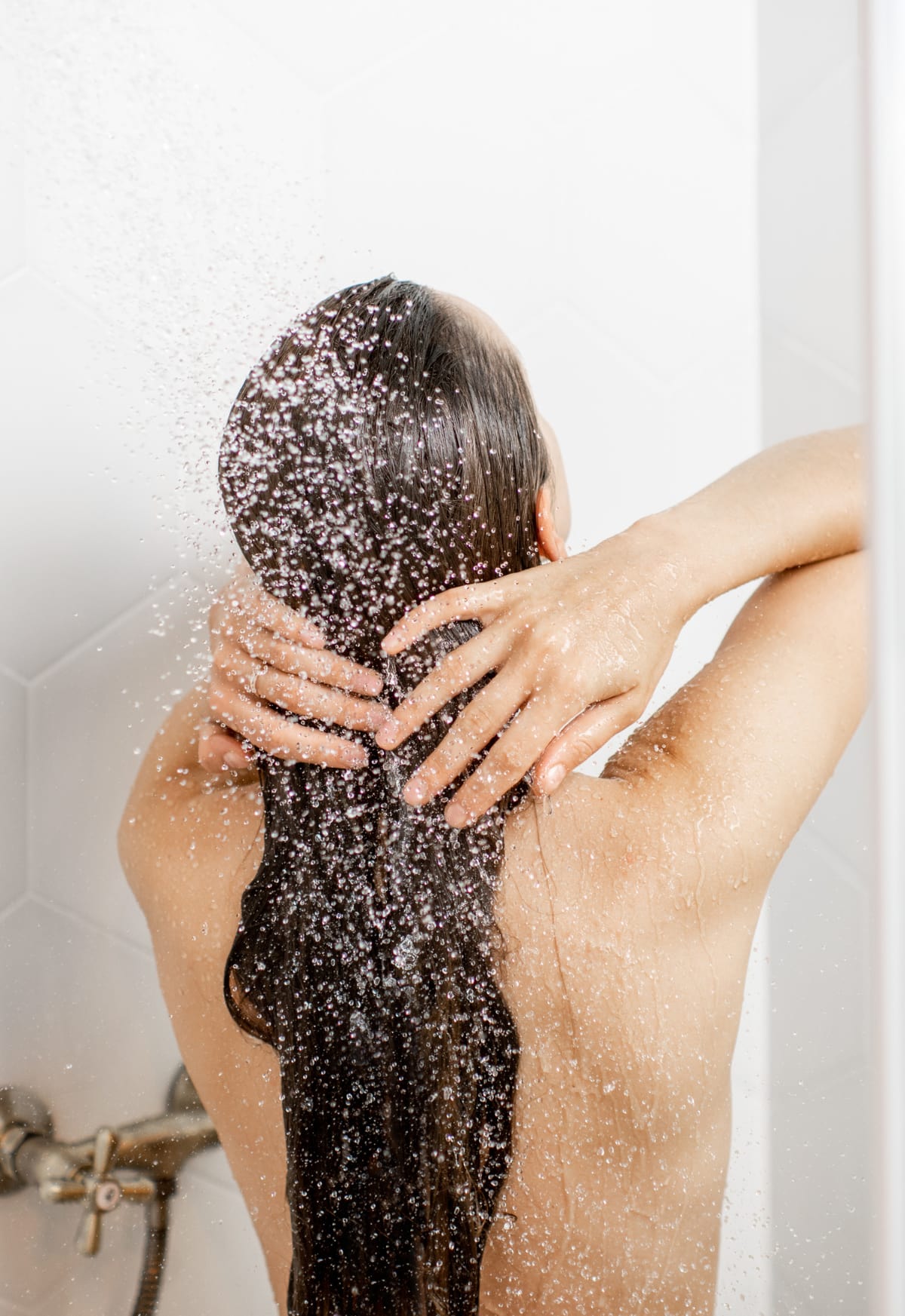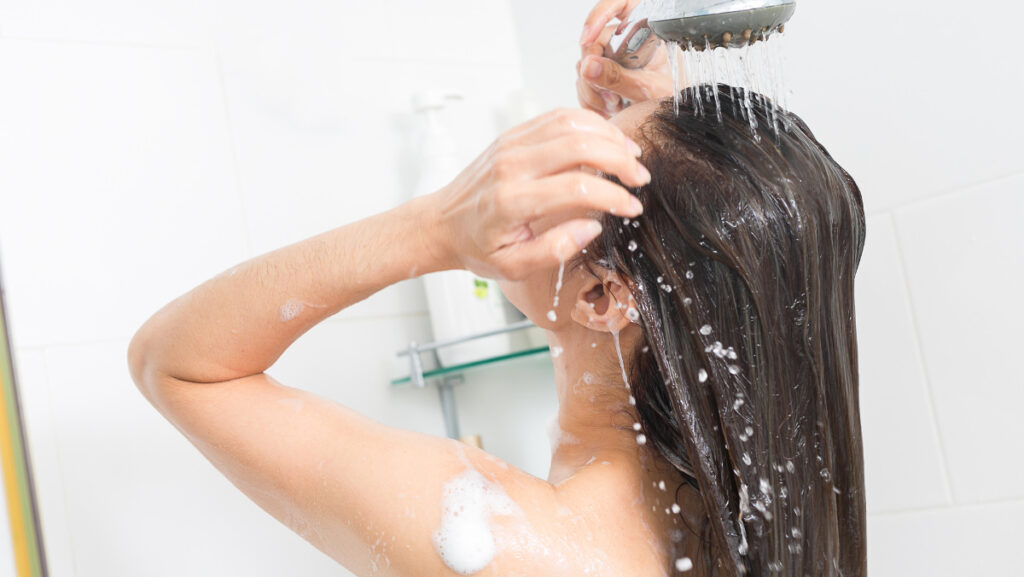
You’ve probably heard about the wonders of exfoliating your face, but what about your scalp? Yep, your scalp is skin, too, and it turns out that giving it a good scrub could be the secret to unlocking the healthiest, most lustrous hair of your life.
After years of struggling with a dry, irritated scalp and looking for improvements, I’ve discovered how to exfoliate your scalp properly (without irritating your scalp!), and I’m excited to share some crucial tips so you can achieve your hair goals, too.
What to expect: We’re going to explore everything about scalp exfoliation—what it is, how to do it correctly, and its countless benefits for hair health.
How To Exfoliate Your Scalp With 5 Easy Methods
A healthy scalp leads to healthy hair growth, and trust me, exfoliating it is way easier than you think. However, since everyone and their preferences are different, let me guide you through 5 simple methods to get that squeaky-clean feeling without any fuss.

Method 1: Use An Exfoliating Shampoo
Exfoliating shampoos blend the cleansing action you love with tiny exfoliating particles or chemicals that help to remove dead skin and buildup. It’s like a spa treatment and a clean slate for your scalp in one bottle.
Ideal for those of you who prefer a straightforward approach, this method is as easy as replacing your regular shampoo. Look for products with salicylic acid (a kind of BHA) or tea tree oil for an extra cleansing boost. They’re phenomenal at keeping things like seborrheic dermatitis at bay.
Method 2: Use An Exfoliating Brush/Dry Brush
If you enjoy a good scalp massage, this one’s for you. Using an exfoliating brush or a dry brush on your scalp not only helps slough off dead skin cells but also boosts blood circulation.
Increased blood flow means more nutrients to your hair follicles, paving the way for healthy hair growth. Remember to use gentle, circular motions to avoid any irritation.
This is my personal favorite method! I love to use the Vegamour GRO Revitalizing Scalp Massager, often in combination with my shampoo.
Method 3: Use A Scalp Scrub
Imagine combining the joys of a scalp massage with the effectiveness of a physical exfoliant. Enter scalp scrubs. These gems can be anything from sea salt to sugar-based formulas enriched with oils like coconut or avocado oil for extra hydration.
For a boost, try the Christophe Robin Cleansing Purifying Scrub or the OUAI Scalp & Body Scrub. They’re favorites of mine for lifting away dead skin cells and product buildup.
Method 4: Use Chemical/Physical Exfoliants
For those deep dive days when your scalp feels like it needs an extra push, chemical exfoliants like BHAs (beta-hydroxy acids) or AHAs come to the rescue. They work by dissolving the dead skin and oil buildup without the need for scrubbing, making them a gentler alternative for sensitive scalps. A little goes a long way, so start slow and see how your scalp reacts.
Physical vs. Chemical Scalp Exfoliants
Physical exfoliants are feel-good, gritty substances that physically remove dead skin cells, product buildup, and excess oils through manual scrubbing. Common physical exfoliants include sea salt, sugar, or even finely ground oatmeal. For a soothing twist, some scrubs might feature peppermint oil or coconut oil, providing a moisturizing and refreshing effect.
Physical exfoliation isn’t just about sloughing away the old; it’s a chance to invigorate your scalp’s blood circulation through massage, paving the way for healthy hair growth. However, it’s crucial to be gentle to avoid any abrasions, especially if you have an open cut or sensitive skin.
On the flip side, chemical exfoliants work their magic without the need for physical scrubbing. Ingredients like beta-hydroxy acids (BHAs) or alpha-hydroxy acids (AHAs) help loosen the glue-like substance holding dead skin cells together, allowing them to wash away effortlessly.
Products containing tea tree oil or apple cider vinegar can also act as mild, natural chemical exfoliants known for addressing issues like seborrheic dermatitis or even infections.
Chemical exfoliants can be a game-changer for those with sensitive scalps. Since there’s no scrubbing involved, the risk of irritation is minimized. Plus, these solutions can penetrate deeper into the scalp, offering a more thorough cleanse without the elbow grease.
Method 5: Use A DIY Alternative
Feeling crafty? Then, a DIY scalp scrub could be your new best friend. Mix ingredients you’ve got lying around – like apple cider vinegar for its clarifying properties or peppermint oil for a refreshing tingle – and you’ve got an effective, personalized scalp treatment. Here are a few simple ones to try:
Scalp Scrub DIY Recipes
Packed with natural ingredients straight from your kitchen, these DIY recipes are not just fun to whip up but are tailored for different hair types. So, let’s dive right into these magical mixes that promise to kickstart your journey towards healthier hair growth.
Avocado and Himalayan Sea Salt Scrub
For those looking to marry hydration with a powerful physical exfoliant, look no further. The Avocado and Himalayan Sea Salt Scrub is a spa-like treat that your scalp has been longing for. Here’s what you need:
- 1 ripe avocado (its oils are perfect for nourishment)
- 2 tablespoons of fine Himalayan sea salt (acts as the physical exfoliant)
- A few drops of peppermint oil (for that refreshing tingle and to stimulate blood circulation)
Mash the avocado in a bowl until it’s smooth, then stir in the sea salt and peppermint oil. Apply this creamy concoction directly to your scalp and massage gently. The sea salt tackles dry flakes, while avocado oil ensures your scalp remains moisturized. Rinse thoroughly and follow up with your usual hair care routine.
Yogurt and Aloe Vera Scalp Scrub
Ideal for sensitive scalps, this gentle yet effective scrub combines the soothing properties of aloe vera with the cleansing power of yogurt. Equally important, yogurt is a natural source of BHAs (beta-hydroxy acids), which help in sloughing off dead skin cells without any harsh rubbing.
- 4 tablespoons of plain yogurt
- 2 tablespoons of aloe vera gel
- 1 teaspoon of honey (for its antibacterial properties)
Simply mix these ingredients until you get a smooth paste. Part your hair and apply the mixture, using your fingers to massage it onto your scalp. This not only cleanses but also leaves your scalp feeling refreshed and balanced.
Coconut Oil And Honey Scrub
Treat your scalp to a moisture-rich feast. Coconut oil is revered for its deep hydrating properties, and when combined with honey, it creates a scalp scrub that not only exfoliates but also fights any lurking infection.
- 3 tablespoons of coconut oil
- 2 tablespoons of honey
- 2 tablespoons of coarse sugar
Warm the coconut oil slightly and mix it with honey. Add the coarse sugar to the mix and stir well. This scrub not only removes dead skin cells but also ensures your scalp is soaked in moisture, promoting healthy hair growth.
Brown Sugar And Jojoba Oil Scrub
This scrub is a boon for those with a dry scalp. Brown sugar, a softer exfoliant than sea salt, and jojoba oil mimic the scalp’s natural oils, thus making it an ideal choice.
- 3 tablespoons of brown sugar
- 2 tablespoons of jojoba oil
- A few drops of tea tree oil (known for its anti-fungal properties, making it great for fighting dandruff)
Mix until you have a coarse paste. Apply it to sections of your hair, giving your scalp a soothing massage as you go. This trio works wonders in keeping the scalp clean and hydrated.
Salt And Olive Oil Scrub
Last but certainly not least is the Salt and Olive Oil Scrub – a simple yet effective cleanser that’s perfect for all hair types. Olive oil is a fantastic moisturizer that prevents your scalp from drying out post-scrub.
- 3 tablespoons of fine sea salt
- 2 tablespoons of olive oil
- A tablespoon of lemon juice (perfect for adding that extra bit of shine to your hair)
Combine these ingredients and softly massage the mixture onto your damp scalp. The lemon juice helps reduce excess oil, leaving you with a refreshed feeling after every wash.

How Often Should You Exfoliate Your Scalp
There’s no one-size-fits-all answer to scalp exfoliation. It largely depends on your hair type, routine, and scalp condition. Those battling seborrheic dermatology or an oily scalp might feel the urge to reach for that scalp scrub more frequently. However, according to Vincent De Marco, once every seven to ten shampoos is a good guideline.
| Hair Type | Recommended Exfoliation Frequency |
|---|---|
| Oily | Every 6-7 washes |
| Normal to Dry | Every 7-10 washes |
| Treated or Damaged | Every 10-12 washes |
Benefits of Scalp Exfoliation
It’s not just about cleansing; it’s a revitalizing ritual that your scalp is silently screaming for. Let’s break it down, shall we?
Removes Scalp Build Up
Imagine your scalp as the soil in a garden; for flowers (your hair) to flourish, the soil needs to be fertile and free from debris. That’s exactly what scalp exfoliation does—it clears away the clutter. Product build-up, dead skin cells, and excess oil, they’ve got no place here.
By incorporating a scalp scrub into your routine, you’re essentially giving your scalp a deep cleanse. And with ingredients like sea salt or apple cider vinegar, you’re not just cleaning; you’re ensuring the scalp is a squeaky-clean canvas, prepped and ready for haircare magic.
Improves Your Hair’s Appearance
We’ve all had those days when our hair feels lifeless and dull, right? Sometimes, no amount of styling or spritzing seems to bring back the shine. That’s where scalp exfoliation steps in; it’s like a reset button.
By removing that layer of grime and buildup, your hair gets a chance to shine (literally). Moreover, applying a hair mask post-scrub can enhance your hair’s appearance as the nutrients penetrate more effectively.
For a glossy effect, follow up with a nourishing mask mixed with avocado oil – or try this Briogeo Curl Charisma Rice Amino + Avocado Hydrating & Defining Hair Mask. This not only amplifies shine but also deeply hydrates your strands.
Encourages Hair Growth
A major player in hair growth is a healthy, unclogged scalp. Think of it this way: for seeds to grow, they need unhindered access to water and nutrients. Similarly, healthy hair growth requires open, clean hair follicles. Exfoliation assists in removing any barriers (like dead skin or excess oil) that might impede growth.
Incorporating scalp treatments infused with peppermint oil can further stimulate growth as peppermint is known for its circulation-boosting properties. Remember, a gentle massage while applying these treatments can make all the difference.
Prevents A Dry Scalp
No one likes the feeling of a tight, itchy scalp. It’s uncomfortable and can lead to issues like seborrheic dermatitis[1] (also known as dandruff or seborrheic psoriasis). Weekly scalp exfoliation can help maintain an ideal balance by sloughing off dry, flaky skin. Plus, by choosing exfoliants with hydrating components like coconut oil or tea tree oil, you provide moisture while you slough.
After exfoliating, a light scalp massage with a few drops of tea tree oil diluted in a carrier oil can be immensely soothing and hydrating.
Keeps Oil Under Control
For those dancing on the oily end of the spectrum, regular exfoliation might sound counterintuitive, but here’s the twist—it’s not. It actually helps regulate sebum production. When you clear away excess oil and product residue, your scalp gets a message that it’s sufficiently clean and doesn’t need to overcompensate by producing more oil.
Conclusion On How To Exfoliate Your Scalp
Now that you’re armed with the know-how to give your scalp the TLC it deserves, it’s time to make scalp exfoliation a non-negotiable in your hair care routine. Remember, a healthy scalp is the foundation of luscious hair. So, don’t shy away from trying out those scrubs and oils.
Your scalp will thank you with hair that not only looks better but feels rejuvenated, too. Here’s to happier, healthier hair days ahead!
